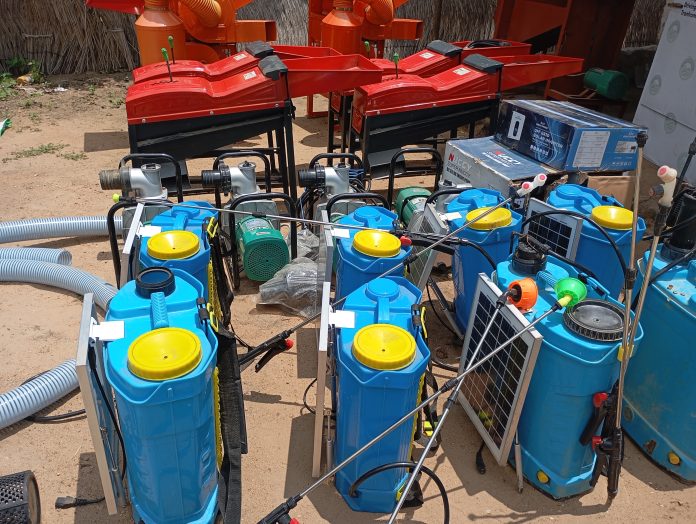By Godfrey AKON
54-year-old Blessing Teneke beams with expectations for bumper harvest after adopting climate-smart seeds and mechanised farming tools to cut labour and boost rice production.
For years, Teneke worked hard to cultivate rice, sorghum, and maize, but her hard work yielded very little, amounting to a seasonal harvest of barely 20 bags of rice.
“We used to take our hoes to the farm and till the ground by hand. Under the scorching sun, we would grow tired quickly, and there was little to show for it.
“We could only harvest around 20 bags, but now, with the equipment, we are expecting a harvest of between 50 and 100 bags. This support has brought us real relief,” she said.
Now equipped with rice and multigrain threshers, solar sprayers and vegetable dryers as well as solar-powered irrigation pumps for dry season farming, the mother of 3 and other women in Old Demsa community have transitioned from hand tools to machines to ease farming and boost harvest.
Old Demsa, a predominantly rice-producing community in Demsa Local Government of Adamawa State, sits on massive arable land along the Benue River, a vital source for irrigation farming in Adamawa State.
With nearly 31 million Nigerians projected by the United Nations to experience severe food insecurity in 2025 due to major funding cuts starting in August, in Adamawa State, smallholder farmers and women have found their rhythm in Clinate-Smart seeds and mechanised farming to address the crisis.
Women in Agriculture
Teneke is one of over a thousand women supported by Women in Mechanised Agriculture, WIMA, implementing partners of the UK-funded agricultural intervention, Propopcom+, in five local government areas of Adamawa State with a target to reshape livelihoods, strengthen food security and boost household incomes.
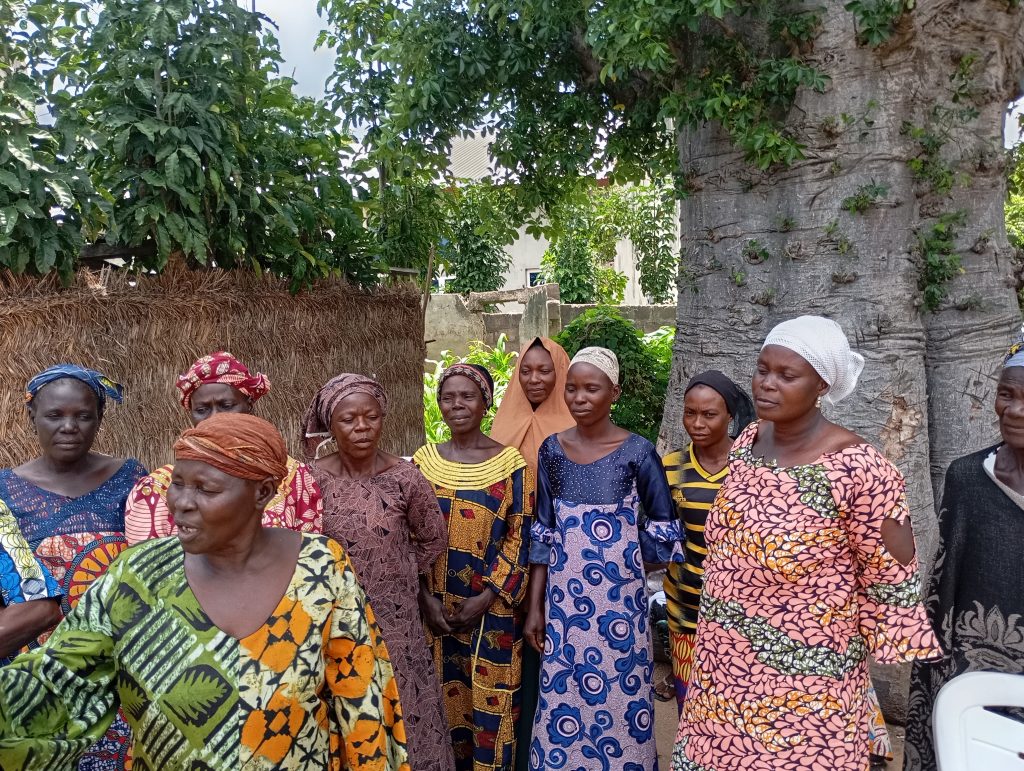
Propcom+, a climate-smart agricultural intervention implemented across Nigeria is not only boosting productivity but has also sparked a quiet revolution, shifting perceptions of women’s role in agriculture.
Across Nigeria, mechanised farming was viewed as the exclusive preserve of men as women were traditionally sidelined in large-scale farming.
But women in Old Demsa are now operators, mechanics, and cooperative leaders; no longer confined to subsistence but integrated into cluster farming, supplied with machines, connected to markets and creating new streams of income.
“For us women, farming is not just about survival; we want to prove that we can do as well as the men, even better. Many men think we cannot achieve much, but we want to show them we can,” Teneke said.
Speaking on the intervention, the Adamawa State Coordinator of WIMA, Ms Ummi Gaya said “We have 19 women beneficiaries here, among them are two operators and even a mechanic. We grouped them into cooperatives to make their work easier. This is how we’re eradicating the old system of farming.”
For Gaya, the work is strategic as she recalls meeting village leaders, introducing the idea of solar mechanisation, and carefully selecting women ready to embrace the climate-smart mechanised farming.
“The response was overwhelming, farmers were eager to break free from the cycle of subsistence and embrace technology,” she said.
A rice farmer in Old Demsa Community, Mrs. Grace Ohel, testified that “before, we harvested five or ten bags, now with the solar pump, we can harvest 20 or 30 bags. It is easier, and I believe we can do even more.”
Implementing Partners
Through Propcom+’s partnership with Community Energy for Social Enterprise Limited, CECEL, Women in Mechanized Agriculture, WIMA, and Girmal Seeds, local farmers are beginning to embrace a new cluster irrigation model that is reshaping how food is grown and how women, in particular, participate in agriculture.
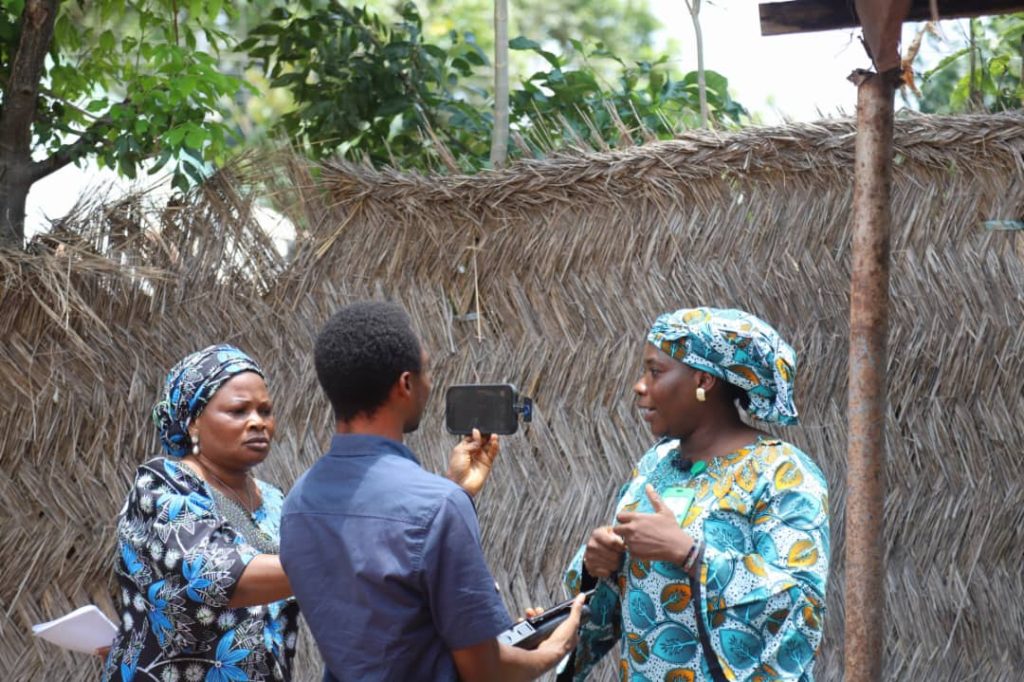
Farmers are organised into clusters, with three solar-powered irrigation pumps serving five hectares of farmland, instead of each farmer struggling alone with traditional tools, they now share modern solar technologies that cut costs, boost yields, and reduce dependence on fossil fuels.
In Adamawa, 50 such clusters have been established across Guyuk, Gire, and Fufore local government areas, with similar models being piloted in Kaduna through other partners.
According to Propocom+, the farmers receive the irrigation systems up front, but ownership is transferred gradually as farmers repayment for the equipment is structured around harvests, allowing farmers to gradually own the assets over five years.
“With two rice farming cycles annually, repayments are tied to harvests, easing the financial burden,” it said.
Speaking on impact of the mechanised intervention, the Village Head of Old Demsa, Ohel Swade, couldn’t hide his joy “I want to appreciate WIMA for locating us. This programme is promoting our women in modern agriculture. God will see us through.”
Transforming the Rural Economy
The Propcom+ intervention is aimed at transforming Nigeria’s rural economy through climate-smart agriculture, targeting nearly four million smallholder farmers and Small and Medium Enterprises, SMEs, by 2030.
According to the Country Representative and Political Lead of Propcom+, Dr. Adiya Ode, the £95 million programme, funded by the UK’s Foreign, Commonwealth and Development Office, FCDO, under its International Climate Finance, ICF, portfolio, is designed to boost productivity and incomes among farmers.
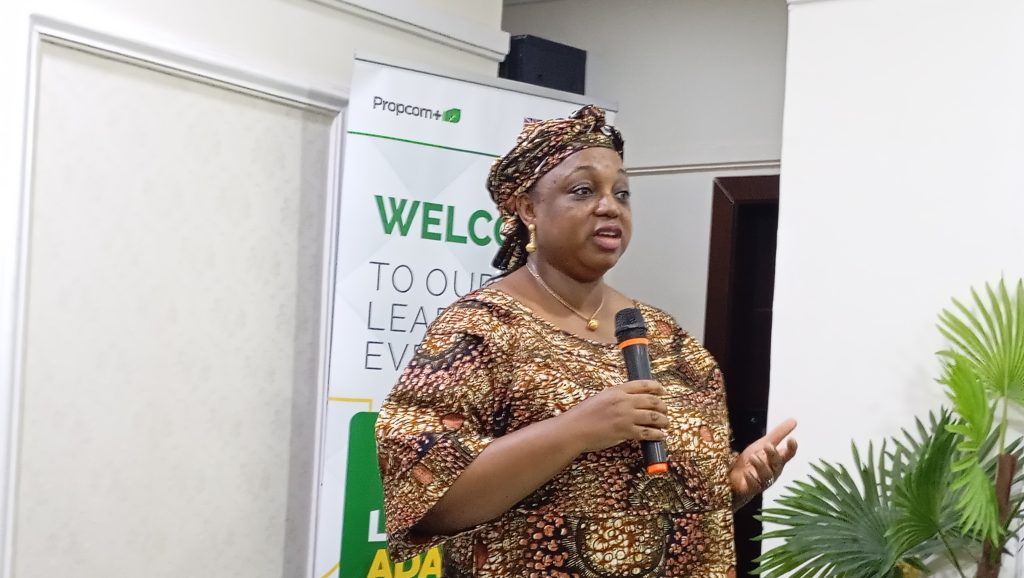
Ode, who spoke during a Media Training in Yola, said by 2030, the programme aims to transform the lives of 3.79 million smallholder farmers and SMEs, ensuring at least half are women or women-led enterprises.
“Our goal is not just food security but also environmental protection, stronger livelihoods, and resilience in the face of climate change,” she said.
She noted that Propcom+ deliberately integrates climate change as a core priority, lamenting that persistent challenges such as land degradation, flooding, drought, low access to finance, and recurring farmer-herder conflicts, have continued to hamper agricultural productivity across Nigeria.
She further stated that Propcom+ adopts a market-systems approach, working with private sector actors and government institutions to strengthen agricultural value chains without distorting existing markets.
“We facilitate market actors and create an enabling environment for sustainable agricultural practices. Our approach is about systemic change, not short-term fixes,” she added.
Ode said Propcom+ is currently active in several states, with Tier 1 focus in the North, including Jigawa, Kaduna, Kano, Adamawa, and Gombe, while also supporting agroforestry and sustainable commodities such as oil palm and cocoa in southern states like Edo, Cross River, Ekiti, Ondo, and Enugu.
She stressed the importance of media collaboration in reshaping public understanding of climate-smart agriculture, saying “the media are not just reporters; they are partners and agents of change. Your work helps Nigerians understand the urgency of adapting agriculture to climate realities.”
The eight-year programme, which officially commenced in 2023, seeks to increase farmer incomes, enhance food security, and mitigate environmental degradation while positioning agriculture as a driver of inclusive rural transformation.
Hybrid Seeds and Outgrowers
Beyond irrigation, another critical area the intervention addresses is seed quality.
Girmal Seeds, a local agribusiness located in Yola, is working with CECEL and Propcom+ to multiply and distribute improved rice varieties resistant to floods and climate shocks.
According to the Managing Director of Girmal Seeds, Mr. Maliki Daniel, farmers often save seeds for years, but the genetic vigor goes down with the passing of time.
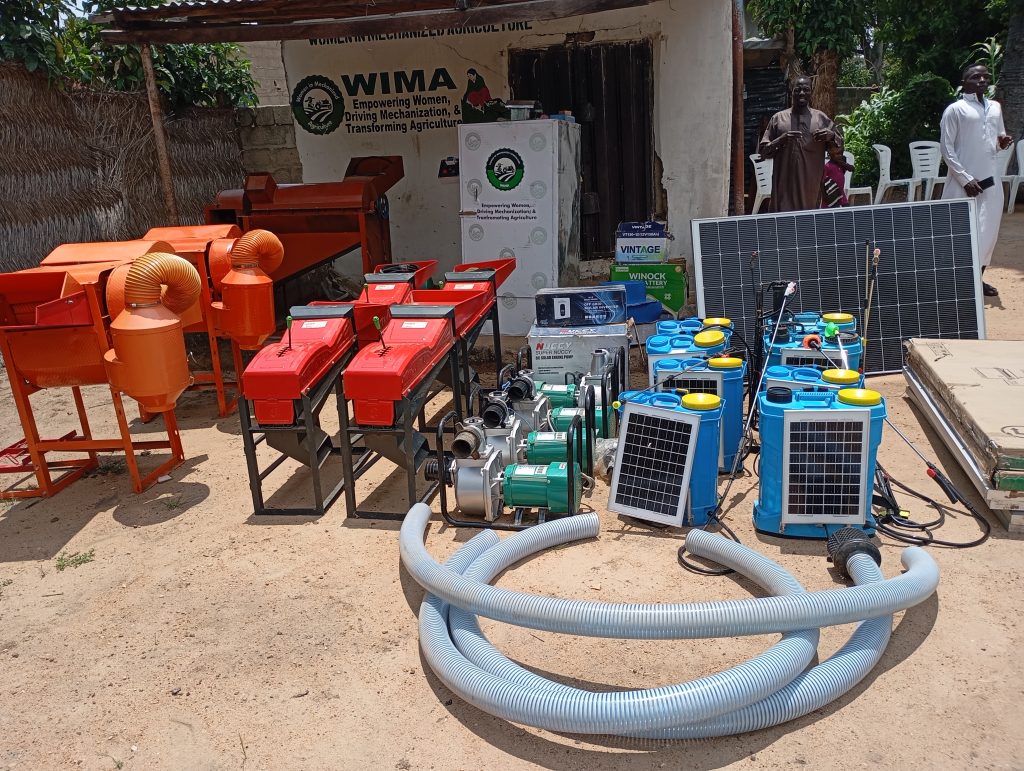
Daniel however noted that with improved seeds, farmers can double their yields, from two tons per hectare to four or even five tons.
He explained that through a system of outgrowers, Girmal provides farmers with certified seeds, fertilizers, and herbicides, then buys back the produce at premium rates.
Project Manager at Girmal Seeds, Mr. Jalyson Maliki, noted that 70 farmers, half of them women, are currently engaged as outgrowers.
“We train them every season, support them, and ensure the National Agricultural Seeds Council certifies the crops. This way, farmers not only grow food but also generate income,” Maliki said.
“Some of these women were not even into farming before. We helped them rent land, formed them into cooperatives, and supported them. Now they are farming rice and contributing to household income.”
Climate-Smart and Cost-Saving
While high cost of fuel could eat into farmers’ profits, and discourage investment by local farmers, operating costs of solar-powered threshers, dryers, sprayers, and irrigation pumps, have dropped by up to 70 for the beneficiaries.
Since petrol or diesel are not used, services are cheaper; for example, spraying that costs N1,500 per hectare with fuel can now be done for N500 to N1,000 using solar-powered equipment.
There are also significant environmental benefits; by reducing dependence on fossil fuels, the programme aligns with Nigeria’s climate commitments and strengthens rural communities’ resilience to climate shocks.
For now, the project is still young; during the dry season when irrigation is most critical, it would bring fuller demonstrations of the technology’s impact.


